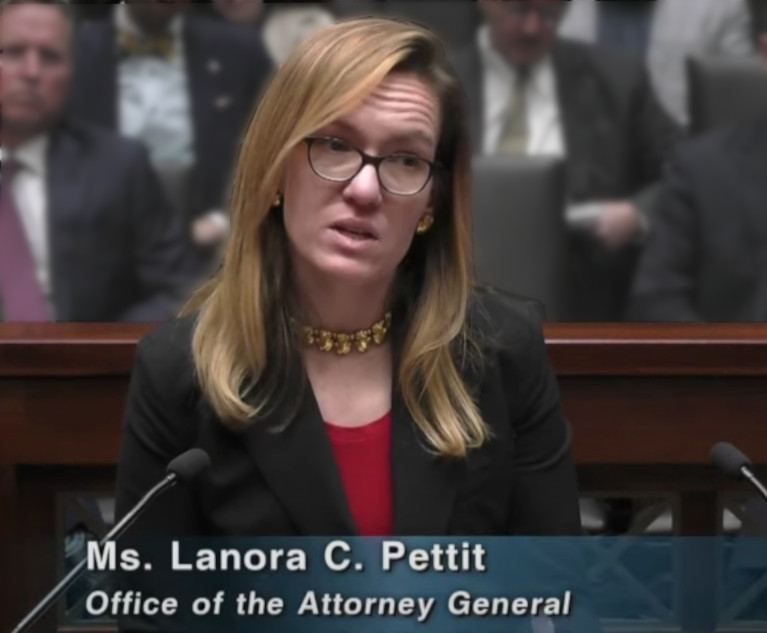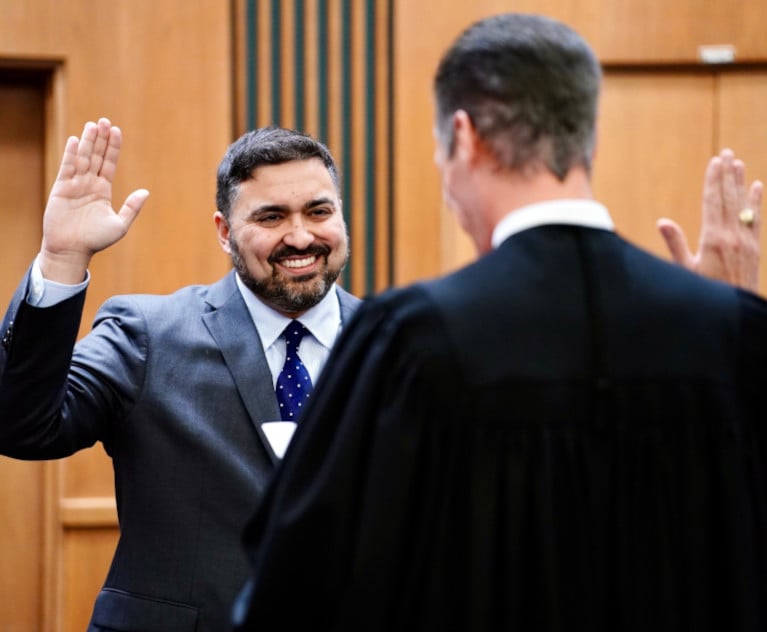Tenth Circuit Affirms District Court Decision To Abstain Under 'Pullman' From Exercising Jurisdiction
The Tenth Circuit affirmed a discretionary decision, concluding that the district court properly abstained and stayed the federal proceedings pending resolution of important state-law issues.
May 20, 2020 at 10:00 AM
7 minute read
 Stephen Masciocchi and Jessica Smith
Stephen Masciocchi and Jessica Smith
In Caldara v. City of Boulder, No. 18-1421, 2020 WL 1814596 (10th Cir. April 10, 2020), plaintiffs challenged the constitutionality of a local ordinance regulating the sale and possession of  firearms. The federal district court abstained from exercising its jurisdiction. The Tenth Circuit affirmed this discretionary decision under Railroad Commission of Texas v. Pullman, 312 U.S. 496 (1941), concluding that the district court properly abstained and stayed the federal proceedings pending resolution of important state-law issues.
firearms. The federal district court abstained from exercising its jurisdiction. The Tenth Circuit affirmed this discretionary decision under Railroad Commission of Texas v. Pullman, 312 U.S. 496 (1941), concluding that the district court properly abstained and stayed the federal proceedings pending resolution of important state-law issues.
Boulder's Firearms Ordinance
In May 2018, the Boulder City Council passed Ordinance 8245, which prohibits the sale or possession of assault weapons and large-capacity ammunition magazines within the city. The Ordinance also raised the legal age for possession of any firearm from 18 to 21.
Plaintiffs, citizens of Boulder and entities with various interests in the sale or possession of firearms within Boulder, sued the city in federal district court, alleging that the Ordinance violates the U.S. Constitution, the Colorado Constitution, and Colorado state statutes.
After plaintiffs sued in Caldara, different individuals and entities sued in Colorado state court challenging the constitutionality of the same Ordinance. Chambers v. City of Boulder, 2018-CV-30581 (Colo. D. Ct., Boulder Cty. June 14, 2018). The plaintiffs in Chambers challenged the Ordinance under Colorado state law, leaving out any claims under the U.S. Constitution.
After Chambers was filed, the defendants in Caldara moved to stay the case under the Pullman abstention doctrine, arguing that the federal court should wait to see how the Colorado state court resolved the state-law issues. Agreeing with defendants, the district court stayed the case pending resolution of Chambers. Plaintiffs appealed to the Tenth Circuit, contending that the district court had abused its discretion.
'Pullman' Abstention
Under Pullman, federal courts can in "exceptional circumstances" abstain from exercising their jurisdiction and stay federal court proceedings pending resolution of state-law issues in state court. Kan. Judicial Review v. Stout, 519 F.3d 1107, 1119 (10th Cir. 2008). "[T]he Pullman concern [is] that a federal court will be forced to interpret state law without the benefit of state-court consideration and … [will] render[] the federal-court decision advisory and the litigation underlying it meaningless." Moore v. Sims, 442 U.S. 415, 428 (1979).
In order for a district court to rely on the Pullman abstention doctrine, three requirements must be met: "(1) an uncertain issue of state law underlies the federal constitutional claim; (2) the state issues are amenable to interpretation and such an interpretation obviates the need for or substantially narrows the scope of the constitutional claim; and (3) an incorrect decision of state law by the district court would hinder important state law policies." Caldara, 2020 WL 1814596, at *3 (citing Lehman v. City of Louisville, 967 F.2d 1474, 1478 (10th Cir. 1992)).
Only if these three requirements are met can a district court exercise its discretion to decline jurisdiction entirely or postpone the exercise of its jurisdiction in deference to state court's resolution of the underlying state law issues. Hartman v. Forssenius, 380 U.S. 528, 534 (1965).
Application of 'Pullman'
In Caldara, the Tenth Circuit decided that all three Pullman requirements had been satisfied and that the district court had acted within its discretion in deciding to stay the case pending resolution of Chambers.
First, there was uncertainty over an important issue of state law that was foundational to the Caldara plaintiffs' constitutional challenge to the Ordinance, namely, whether Boulder had exceeded its authority under the Colorado constitution to enact the Ordinance in the first place.
Boulder is a home-rule municipality under the Colorado constitution, which allows it to pass ordinances in "local and municipal matters" that supersede "any law of the state in conflict therewith." Colo. Const. art. XX, §6. But a home-rule municipality's ordinance is preempted if the ordinance deals with matters of statewide concern and is in conflict with state law on the subject. City & Cty. Of Denver v State, 788 P.2d 764, 767 (Colo. 1990). And where the issue is of mixed local and state concern, an ordinance may coexist with a state law only as long as there is no conflict; if there is a conflict, the state law wins. Id.
Plaintiffs in both Caldara and Chambers contend that the Ordinance is preempted by Colo. Rev. Stat. §§29-11.7-102 & 103, which provide that a "local government may not enact an ordinance, regulation, or other law that prohibits the sale, purchase, or possession of a firearm that a person may lawfully sell, purchase, or possess under state or federal law."
To decide whether the Ordinance is preempted, a court would need to determine (1) whether the regulation of firearms is a matter of local, state, or mixed concern and (2) if it is a matter of state or mixed concern, whether there is a conflict between the Ordinance and Colorado state law. Further complicating matters, the Tenth Circuit explained that there is considerable uncertainty under Colorado state law regarding whether the state considers the regulation of firearms as a matter of state or local concern. In a prior case, the Colorado Supreme Court had split evenly over whether Denver firearms ordinances were preempted by state law. Caldara, 2020 WL 1814596, at *3 (citing State v. City & Cty. of Denver, 139 P.3d 635, 636 (Colo. 2006) (3-3 decision, J. Eid not participating)).
Given these doubts related to Colorado state law, the Tenth Circuit concluded that the first Pullman factor had been satisfied.
Second, the state-law preemption issue could be determinative of the federal constitutional questions. If Boulder exceeded its home-rule authority such that the Ordinance is preempted by state law, then the Ordinance would be invalid on that basis, and no court need analyze whether it also violates the U.S. Constitution. Thus, the second factor had also been satisfied.
Third, the risk of the federal court disrupting important state-law policies is considerable, because the preemption question implicates the balance of power between home-rule municipalities and the state of Colorado. In this regard, the Tenth Circuit was guided by the fact that the U.S. Supreme Court has already found the third Pullman factor satisfied where the issue "involves a question as to whether a city has trespassed on the domain of a State." City of Chicago v. Fieldcrest Dairies, 316 U.S. 168, 172 (1942). The third Pullman factor had been satisfied.
Finally, once all three factors had been satisfied, the Tenth Circuit analyzed whether the district court had abused its discretion in deciding to abstain from exercising its jurisdiction. To answer this question, the court balanced the desire to defer to states on important issues of state concern against the inherent delays associated with abstention. Because a state court was already on its way toward deciding the state-law issues, the Tenth Circuit concluded that the concern as to delay was sufficiently mitigated. The court therefore held "that the district court properly abstained as 'appropriate regard for the rightful independence of state governments[.]" Caldara, 2020 WL 1814596, at *6.
Stephen Masciocchi and Jessica Smith are attorneys at Holland & Hart specializing in complex commercial litigation. Steve assists clients with federal and state appeals and class actions in high-stakes trial and appellate litigation. Jessica has substantial appellate experience and leads the firm's religious institutions and First Amendment practice.
This content has been archived. It is available through our partners, LexisNexis® and Bloomberg Law.
To view this content, please continue to their sites.
Not a Lexis Subscriber?
Subscribe Now
Not a Bloomberg Law Subscriber?
Subscribe Now
NOT FOR REPRINT
© 2025 ALM Global, LLC, All Rights Reserved. Request academic re-use from www.copyright.com. All other uses, submit a request to [email protected]. For more information visit Asset & Logo Licensing.
You Might Like
View All


Law Firms Mentioned
Trending Stories
Who Got The Work
J. Brugh Lower of Gibbons has entered an appearance for industrial equipment supplier Devco Corporation in a pending trademark infringement lawsuit. The suit, accusing the defendant of selling knock-off Graco products, was filed Dec. 18 in New Jersey District Court by Rivkin Radler on behalf of Graco Inc. and Graco Minnesota. The case, assigned to U.S. District Judge Zahid N. Quraishi, is 3:24-cv-11294, Graco Inc. et al v. Devco Corporation.
Who Got The Work
Rebecca Maller-Stein and Kent A. Yalowitz of Arnold & Porter Kaye Scholer have entered their appearances for Hanaco Venture Capital and its executives, Lior Prosor and David Frankel, in a pending securities lawsuit. The action, filed on Dec. 24 in New York Southern District Court by Zell, Aron & Co. on behalf of Goldeneye Advisors, accuses the defendants of negligently and fraudulently managing the plaintiff's $1 million investment. The case, assigned to U.S. District Judge Vernon S. Broderick, is 1:24-cv-09918, Goldeneye Advisors, LLC v. Hanaco Venture Capital, Ltd. et al.
Who Got The Work
Attorneys from A&O Shearman has stepped in as defense counsel for Toronto-Dominion Bank and other defendants in a pending securities class action. The suit, filed Dec. 11 in New York Southern District Court by Bleichmar Fonti & Auld, accuses the defendants of concealing the bank's 'pervasive' deficiencies in regards to its compliance with the Bank Secrecy Act and the quality of its anti-money laundering controls. The case, assigned to U.S. District Judge Arun Subramanian, is 1:24-cv-09445, Gonzalez v. The Toronto-Dominion Bank et al.
Who Got The Work
Crown Castle International, a Pennsylvania company providing shared communications infrastructure, has turned to Luke D. Wolf of Gordon Rees Scully Mansukhani to fend off a pending breach-of-contract lawsuit. The court action, filed Nov. 25 in Michigan Eastern District Court by Hooper Hathaway PC on behalf of The Town Residences LLC, accuses Crown Castle of failing to transfer approximately $30,000 in utility payments from T-Mobile in breach of a roof-top lease and assignment agreement. The case, assigned to U.S. District Judge Susan K. Declercq, is 2:24-cv-13131, The Town Residences LLC v. T-Mobile US, Inc. et al.
Who Got The Work
Wilfred P. Coronato and Daniel M. Schwartz of McCarter & English have stepped in as defense counsel to Electrolux Home Products Inc. in a pending product liability lawsuit. The court action, filed Nov. 26 in New York Eastern District Court by Poulos Lopiccolo PC and Nagel Rice LLP on behalf of David Stern, alleges that the defendant's refrigerators’ drawers and shelving repeatedly break and fall apart within months after purchase. The case, assigned to U.S. District Judge Joan M. Azrack, is 2:24-cv-08204, Stern v. Electrolux Home Products, Inc.
Featured Firms
Law Offices of Gary Martin Hays & Associates, P.C.
(470) 294-1674
Law Offices of Mark E. Salomone
(857) 444-6468
Smith & Hassler
(713) 739-1250









